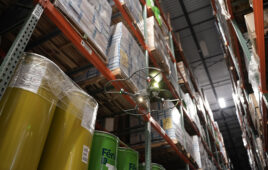Between the Wikileaks scandals of the past few years and the more recent Snowden disclosures, anyone who thought that governments don’t spy on other governments has been completely cleared of that misconception. But what about industry? Who is spying on whom? And what’s fair in the international marketplace—whose ethics do we follow? Is corporate spying okay? How about counterfeiting? Or copying designs?
At one point in my career, I covered the hotel design industry, and some of the big industry events included everything from furniture to lighting to fabrics. Those were always great events to see the latest designs, where both individual designers and large corporations showed off their latest inspirations. As an editor, I was at first surprised by how restrictive the shows were about photography on the show floor. I wanted to take photos for my readers, to illustrate what the latest trends were.
On inquiring as to the reason for the restrictions, I was told by multiple designers, point blank, that it was because of China. Each year, they’d come over and take photos of the more popular, unique new products—and within weeks or months, there would be low quality copies all over the market.
In the industrial sector, bearing manufacturer SKF has long tried to shed light on the issue of counterfeit bearings. At a recent press event, we were told that some counterfeit packaging can even fool SKF employees, the crooks are getting so good at it. Even in the past month, stories have come out describing how Parker Hannifin is embedding RFID tags in O-rings to prevent counterfeiting and how a Chinese company is offering a knockoff 3D printing pen, copying a development made famous on Kickstarter.
Tina Astrom, Director, Group Brand Protection for SKF, estimates that 90% of all SKF counterfeits come from China or Singapore.
“We assume that goods coming from Singapore are actually originating from China even if the shipping documents indicate something else. This number is also confirmed by the many seizures made by U.S. customs authorities of counterfeit bearings,” said Astrom.
Because counterfeit industrial products like bearings are not bought intentionally by customers, Astrom says that the best way to fight counterfeit is to raise awareness. Customers who accidentally purchase counterfeit materials are being cheated financially and risk damage to their machinery.
Yet Astrom feels that we should stop pointing the finger at China and instead put the blame on distributors in the U.S. that knowingly import counterfeit parts from China.
“Counterfeit bearings of premium brands are made through just applying the well-known trademark to a non-branded bearing in small and simple workshops,” she said. “The illegal branding is not done until the order is received. Thus, as long as there are distributors in the U.S. and elsewhere that are eager to gain a financial advantage through selling counterfeit to unknowing customers, there will be suppliers.”
So we’ve got our share of unethical businesspeople here, too, but it doesn’t seem as systematic to me as it is overseas. We can argue about democracy and whether other cultures around the world want our particular style of it, but can we argue about what ethics are? Is our notion of right from wrong the same in China’s culture? And how do we move forward in making a country like China follow the same rules that our manufacturers do? It’s not an easy question and the answers sure aren’t clear.
Is there such a thing as manufacturing ethics? Comment on Paul’s blog on Pneumatic Tips, www.pneumatictips.com/blog
Paul J. Heney – Editorial Director
[email protected]
Filed Under: Uncategorized





Tell Us What You Think!